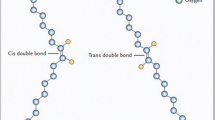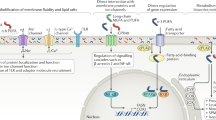Abstract
Evidence from randomized controlled trials indicates that consumption of trans fatty acids (TFA) leads to harmful changes in serum lipids, systemic inflammation, endothelial function, and, in nonhuman primates, visceral adiposity and insulin resistance. Prospective observational studies demonstrate strong positive associations between TFA consumption and risk of myocardial infarction, coronary heart disease death, and sudden death. Links have also been seen between TFA intake and incidence of diabetes, adiposity, and other chronic conditions. The physiologic effects demonstrated in randomized trials suggest that TFA consumption produces a unique cardiometabolic imprint via pathways linked to the insulin resistance syndrome. The strength and consistency of the evidence for harmful effects of TFA, together with the feasibility of elimination of industrially produced TFA from foods, indicates little reason for continued use of partially hydrogenated oils containing TFA in food preparation and manufacturing. Consumer education regarding the sources and hazards of TFA, combined with voluntary or legislated adoption by restaurants and food manufacturers of alternatives to partially hydrogenated oils, could avert tens of thousands of coronary events each year in the United States and around the world.
Similar content being viewed by others
References and Recommended Reading
Lueck TJ, Severson K: New York bans most trans fats in restaurants. The New York Times. December 6, 2006; A1.
Eckel RH, Borra S, Lichtenstein AH, Yin-Piazza SY: Understanding the complexity of trans fatty acid reduction in the American diet: American Heart Association Trans Fat Conference 2006: report of the Trans Fat Conference Planning Group. Circulation 2007, 115:2231–2246.
Craig-Schmidt MC: World-wide consumption of trans fatty acids. Atheroscler Suppl 2006, 7:1–4.
Allison DB, Egan SK, Barraj LM, et al.: Estimated intakes of trans fatty and other fatty acids in the US population. J Am Diet Assoc 1999, 99:166–174.
Stender S, Dyerberg J, Astrup A: High levels of industrially produced trans fat in popular fast foods. N Engl J Med 2006, 354:1650–1652.
Dietary Guidelines Advisory Committee: 2005 Dietary Guidelines Advisory Committee Report. Available at http://www.health.gov/dietaryguidelines/dga2005/report. Accessed November 2, 2006.
Chardigny JM, Malpuech-Brugere C, Dionisi F, et al.: Rationale and design of the TRANSFACT project phase I: a study to assess the effect of the two different dietary sources of trans fatty acids on cardiovascular risk factors in humans. Contemp Clin Trials 2006, 27:364–373.
Jakobsen MU, Bysted A, Andersen NL, et al.: Intake of ruminant trans fatty acids in the Danish population aged 1–80 years. Eur J Clin Nutr 2006, 60:312–318.
Oomen CM, Ocke MC, Feskens EJ, et al.: Association between trans fatty acid intake and 10-year risk of coronary heart disease in the Zutphen Elderly Study: a prospective population-based study. Lancet 2001, 357:746–751.
Pietinen P, Ascherio A, Korhonen P, et al.: Intake of fatty acids and risk of coronary heart disease in a cohort of Finnish men. The Alpha-Tocopherol, Beta-Carotene Cancer Prevention Study. Am J Epidemiol 1997, 145:876–887.
Willett WC, Stampfer MJ, Manson JE, et al.: Intake of trans fatty acids and risk of coronary heart disease among women. Lancet 1993, 341:581–585.
Mozaffarian D, Katan MB, Ascherio A, et al.: Trans fatty acids and cardiovascular disease. N Engl J Med 2006, 354:1601–1613.
Mozaffarian D, Pischon T, Hankinson SE, et al.: Dietary intake of trans fatty acids and systemic inflammation in women. Am J Clin Nutr 2004, 79:606–612.
Lopez-Garcia E, Schulze MB, Meigs JB, et al.: Consumption of trans fatty acids is related to plasma biomarkers of inflammation and endothelial dysfunction. J Nutr 2005, 135:562–566.
Mozaffarian D, Rimm EB, King IB, et al.: Trans fatty acids and systemic inflammation in heart failure. Am J Clin Nutr 2004, 80:1521–1525.
Han SN, Leka LS, Lichtenstein AH, et al.: Effect of hydrogenated and saturated, relative to polyunsaturated, fat on immune and inflammatory responses of adults with moderate hypercholesterolemia. J Lipid Res 2002, 43:445–452.
Baer DJ, Judd JT, Clevidence BA, Tracy RP: Dietary fatty acids affect plasma markers of inflammation in healthy men fed controlled diets: a randomized crossover study. Am J Clin Nutr 2004, 79:969–973.
Libby P, Ridker PM, Maseri A: Inflammation and atherosclerosis. Circulation 2002, 105:1135–1143.
Ridker PM, Hennekens CH, Buring JE, Rifai N: C-reactive protein and other markers of inflammation in the prediction of cardiovascular disease in women. N Engl J Med 2000, 342:836–843.
Zapolska-Downar D, Kosmider A, Naruszewicz M: Trans fatty acids induce apoptosis in human endothelial cells. J Physiol Pharmacol 2005, 56:611–625.
de Roos NM, Bots ML, Katan MB: Replacement of dietary saturated fatty acids by trans fatty acids lowers serum HDL cholesterol and impairs endothelial function in healthy men and women. Arterioscler Thromb Vasc Biol 2001, 21:1233–1237.
Willett WC, Leibel RL: Dietary fat is not a major determinant of body fat. Am J Med 2002, 113(Suppl 9B):47S–59S.
Koh-Banerjee P, Chu NF, Spiegelman D, et al.: Prospective study of the association of changes in dietary intake, physical activity, alcohol consumption, and smoking with 9-y gain in waist circumference among 16 587 US men. Am J Clin Nutr 2003, 78:719–727.
Field AE, Willett WC, Lissner L, Colditz GA: Dietary fat and weight gain among women in the Nurses’ Health Study. Obesity (Silver Spring) 2007, 15:967–976.
Kavanagh K, Jones KL, Sawyer J, et al.: Trans-fat diet induces abdominal obesity and changes in insulin sensitivity in monkeys. Obesity Res 2007, In press.
Louheranta AM, Turpeinen AK, Vidgren HM, et al.: A high-trans fatty acid diet and insulin sensitivity in young healthy women. Metab Clin Exp 1999, 48:870–875.
Lovejoy JC, Smith SR, Champagne CM, et al.: Effects of diets enriched in saturated (palmitic), monounsaturated (oleic), or trans (elaidic) fatty acids on insulin sensitivity and substrate oxidation in healthy adults. Diabetes Care 2002, 25:1283–1288.
Lefevre M, Lovejoy JC, Smith SR, et al.: Comparison of the acute response to meals enriched with cis-or transfatty acids on glucose and lipids in overweight individuals with differing FABP2 genotypes. Metab Clin Exp 2005, 54:1652–1658.
Albuquerque KT, Sardinha FL, Telles MM, et al.: Intake of trans fatty acid-rich hydrogenated fat during pregnancy and lactation inhibits the hypophagic effect of central insulin in the adult offspring. Nutrition 2006, 22:820–829.
Innis SM: Trans fatty intakes during pregnancy, infancy and early childhood. Atheroscler Suppl 2006, 7:17–20.
Saravanan N, Haseeb A, Ehtesham NZ, Ghafoorunissa R: Differential effects of dietary saturated and trans-fatty acids on expression of genes associated with insulin sensitivity in rat adipose tissue. Eur J Endocrinol / Eur Federation Endocr Soc 2005, 153:159–165.
Niu SL, Mitchell DC, Litman BJ: Trans fatty acid derived phospholipids show increased membrane cholesterol and reduced receptor activation as compared to their cis analogs. Biochemistry 2005, 44:4458–4465.
Chavarro JE, Rich-Edwards JW, Rosner BA, Willett WC: Dietary fatty acid intakes and the risk of ovulatory infertility. Am J Clin Nutr 2007, 85:231–237.
Tsai CJ, Leitzmann MF, Willett WC, Giovannucci EL: Long-term intake of trans-fatty acids and risk of gallstone disease in men. Arch Inter Med 2005, 165:1011–1015.
Lemaitre RN, King IB, Mozaffarian D, et al.: Plasma phospholipid trans fatty acids, fatal ischemic heart disease, and sudden cardiac death in older adults: the Cardiovascular Health Study. Circulation 2006, 114:209–215.
Harris WS, Reid KJ, Sands SA, Spertus JA: Blood omega-3 and trans fatty acids in middle-aged acute coronary syndrome patients. Am J Cardiol 2007, 99:154–158.
Sun Q, Ma J, Campos H, et al.: A prospective study of trans fatty acids in erythrocytes and risk of coronary heart disease. Circulation 2007, 115:1858–1865.
Roberts TL, Wood DA, Riemersma RA, et al.: Trans isomers of oleic and linoleic acids in adipose tissue and sudden cardiac death. Lancet 1995, 345:278–282.
Lemaitre RN, King IB, Raghunathan TE, et al.: Cell membrane trans-fatty acids and the risk of primary cardiac arrest. Circulation 2002, 105:697–701.
van Dam RM, Rimm EB, Willett WC, et al.: Dietary patterns and risk for type 2 diabetes mellitus in U.S. men. Ann Intern Med 2002, 136:201–209.
Meyer KA, Kushi LH, Jacobs DR Jr, Folsom AR: Dietary fat and incidence of type 2 diabetes in older Iowa women. Diabetes Care 2001, 24:1528–1535.
Hu FB, Manson JE, Stampfer MJ, et al.: Diet, lifestyle, and the risk of type 2 diabetes mellitus in women. N Engl J Med 2001, 345:790–797.
Institute of Medicine: Dietary Reference Intakes for Energy, Carbohydrate, Fiber, Fat, Fatty Acids, Cholesterol, Protein, and Amino Acids (Macronutrients). Washington, DC: National Academy Press; 2005.
Leth T, Jensen HG, Mikkelsen AA, Bysted A: The effect of the regulation on trans fatty acid content in Danish food. Atheroscler Suppl 2006, 7:53–56.
Nielsen K: Is the quality and cost of food affected if industrially produced trans fatty acids are removed? Atheroscler Suppl 2006, 7:61–62.
Health Canada: Government response to the interim recommendations of the trans fat task force. Available at http://www.hc-sc.gc.ca/fn-an/nutrition/gras-transfats/government_response_reponse_gouvernement_e.html. Accessed November 2, 2006.
Aro A: The scientific basis for trans fatty acid regulations-is it sufficient? A European perspective. Atheroscler Suppl 2006, 7:67–68.
North Carolina General Statutes, Chapter 115C: Elementary and Secondary Education. Available at http://www.ncga.state.nc.us/enactedlegislation/statutes/html/bysection/chapter_115c/gs_115c-264.html. Accessed November 2, 2006.
Center for Science in the Public Interest: Petition for rulemaking to revoke the authority for industry to use partially hydrogenated vegetable oils in foods. Available at http://cspinet.org/new/pdf/trans_fat_petition_may_18.pdf. Accessed November 2, 2006.
Katan MB: Regulation of trans fats: the gap, the Polder, and McDonald’s French fries. Atheroscler Suppl 2006, 7:63–66.
Author information
Authors and Affiliations
Corresponding author
Rights and permissions
About this article
Cite this article
Mozaffarian, D., Willett, W.C. Trans fatty acids and cardiovascular risk: A unique cardiometabolic imprint?. Curr Atheroscler Rep 9, 486–493 (2007). https://doi.org/10.1007/s11883-007-0065-9
Published:
Issue Date:
DOI: https://doi.org/10.1007/s11883-007-0065-9




